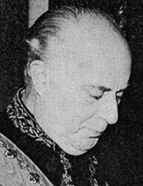

The list of his works stands witness to his historiographical mission undertaken, with a sense of service, as part of his diplomatic duties and is consistent with the circumstances of a career that took him to almost every continent. In each one of these places he found the presence of the Portuguese Diaspora linked to the Portuguese national destiny. The memory of a common past for the continuation and strengthening of these ties in the future could not be extinguished. Eduardo Brazão imbued his numerous works with this same sense, seeking to overcome the "desolating amnesia on the real values being forgotten" ("Preface", Historical Studies, 1984). A never-ending collection of sources in foreign archives led to numerous publications on Portuguese Diplomatic History, while his reports – A França em Abril de 1944 (France in April 1944), A Internacionalização da Santa Sé (The Internationalisation of the Holy See) or Os portugueses em Hong Kong (The Portuguese in Hong Kong) – displayed a keen observation of contemporary realities, which would later give him some trouble, particularly in the case of his monograph Portugal e a Inglaterra na China (Portugal and England in China, 1947), submitted for the entry exam for Counsellor and Consul general. His request for publication was turned down, not so much for his political views on the government's recognition of Mao Tse Tung, but primarily because the censors felt his text had the underlying idea "that we didn't know how to carry out the colonisation work in Macau that we had started" (AHMNE, Processo individual No. 94, Report, 1 July 1952).
Eduardo Brazão missed no opportunity to publicise the History of Portugal, taking advantage of the pretext provided by celebrations of historical dates. Even before entering his career, the double centenary of the Portuguese nationality led him to write on the diplomatic work of Portugal during the Restoration. It was a way to draw attention to another kind of hero, the diplomat, and another type of war, that of intelligence, “more brilliant, undoubtedly, than those fought between armies" and also an opportunity to highlight the works of Edgar Prestage, "to whom Portugal owes a great debt, still outstanding" (A Restauração, 1939, p. 11). He wrote Em demanda do Cataio (In Demand of Cathay, 1954) so that in the year of the seventh centenary of the birth of Marco Polo the voice of Portugal would also be heard, remembering the journey of Bento de Góis to China. In the centenary year of the marriage of D. Luís and D. Maria Pia of Savoy (6 October 1862) he published L'unificazione Italiana vista dai diplomatici Portoghesi, containing the reports of Portuguese diplomats, 1848-1870. The book, published by the Istituto per la Storia del Risorgimento Italiano, was considered “un’opera di rilevantissima importanza, senza la qual la storia di quel fondamentale período della nostra formazione nazionale non sarebbe stata completa” (Il Tempo, 21 de Novembro de 1962).
